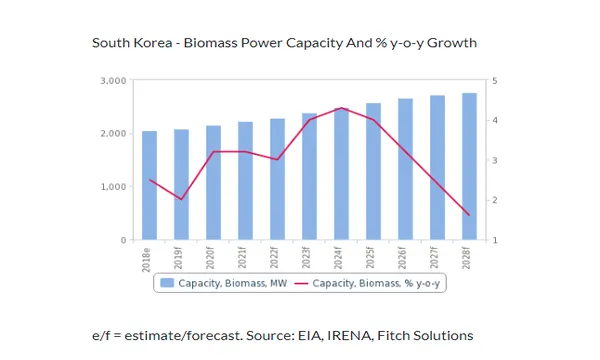
South Korea could be next biomass market leader: report
The country is forecasted to add 730MW of biomass over the coming decade.
South Korea could be the next biomass power market to watch as the government sets ambitious renewables targets and incentives to encourage developments in the sector, according to a report by Fitch Solutions.
Under president Moon Jae-in, the government has taken assertive action to reduce the role of coal and nuclear, and boost gas and renewables instead. The introduction of Renewable Portfolio Standard (RPS), which obligates power companies to increase their renewable energy mix at a mandated target a year, has reportedly supported the rapid growth of solar, wind and biomass.
In December 2017, the government also introduced its "Renewable Energy 3020" plan, which targets 20% power generation from renewable sources by 2030. Fitch Solutions noted that the government is looking to revise this to 30-35% by 2040.
“Whilst these plans have been largely focused on solar and offshore wind, we believe biomass also offers substantial growth potential,” the firm highlighted, given that demand for wood pellets and other wood biomass sources have grown substantially over the last few years. Fitch Solutions explained that this could be a reflection of the successful development of the biomass sector, particularly in co-firing.
The report, which further highlighted how South Korea is endowed with large forest territories, has wood residues from its sawmilling industries which could be leveraged, forecasted South Korea to add approximately 730MW of biomass over the coming decade.
Following a revision of the RPS, which increased subsidies for projects using domestic biomass sources whilst reducing those for imported ones, many biomass plant developers have sped up their project developments to attain more favourable Renewable Energy Certificate weightings.
“We maintain a fairly cautious outlook to overall growth, given that the government is also considering to reduce support for biomass co-firing, after noting that a large number of power companies have been using co-firing to meet their RPS targets, and is expected to come up with a policy decision by mid-2019,” Fitch Solutions commented.
Should the policy go through, power companies are expected to move towards more renewable power generation plants in order to continue meeting their RPS targets.








![Cross Domain [Manu + SBR + ABF + ABR + FMCG + HBR + ]](https://cmg-qa.s3.ap-southeast-1.amazonaws.com/s3fs-public/styles/exclusive_featured_article/public/2025-01/earth-3537401_1920_4.jpg.webp?itok=WaRpTJwE)
![Cross Domain [SBR + ABR]](https://cmg-qa.s3.ap-southeast-1.amazonaws.com/s3fs-public/styles/exclusive_featured_article/public/2025-01/pexels-jahoo-867092-2_1.jpg.webp?itok=o7MUL1oO)









 Advertise
Advertise


